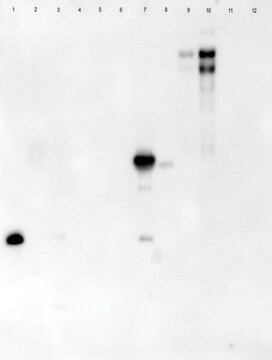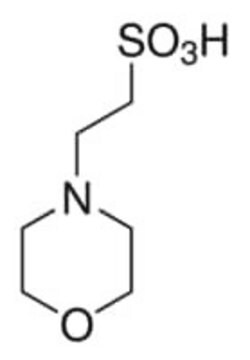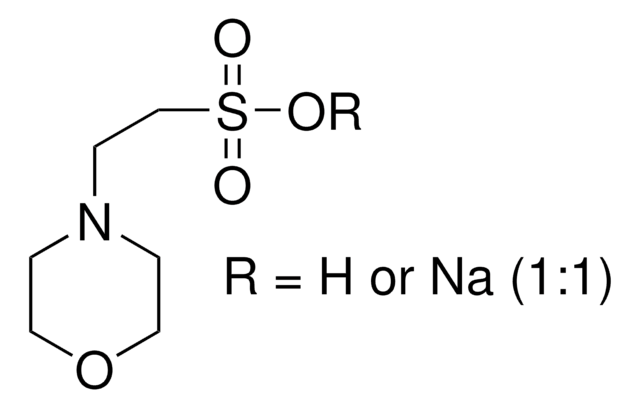M5287
MES hydrate
≥99.5% (titration), pH 2.5-4.0 (0.5 M in H2O), BioXtra
Sinónimos:
Ácido 2-(N-morfolino)etanosulfónico hydrate, Ácido 4-morfolinoetanosulfónico
About This Item
Productos recomendados
Quality Level
product line
BioXtra
assay
≥99.5% (titration)
form
crystalline powder
storage condition
dry at room temperature
impurities
Insoluble matter, passes filter test
ign. residue (900°C)
≤0.05%
color
white
pH
2.5-4.0 (0.5 M in H2O)
useful pH range
5.5-6.7
pKa
6.1
solubility
H2O: 0.5 M, clear, colorless
water: 335.3 g/L at 20 °C
anion traces
chloride (Cl-): ≤0.005%
cation traces
Al: ≤0.0005%
As: ≤0.0001%
Ba: ≤0.0005%
Bi: ≤0.0005%
Ca: ≤0.002%
Cd: ≤0.0005%
Co: ≤0.0005%
Cr: ≤0.0005%
Cu: ≤0.0005%
Fe: ≤0.0005%
K: ≤0.005%
Li: ≤0.0005%
Mg: ≤0.0005%
Mn: ≤0.0005%
Mo: ≤0.0005%
Na: ≤0.005%
Ni: ≤0.0005%
Pb: ≤0.0005%
Sr: ≤0.0005%
Zn: ≤0.0005%
absorption
≤0.020 at 280 in H2O at 0.5 M
≤0.025 at 260 in H2O at 0.5 M
application(s)
cell analysis
life science and biopharma
sample preparation
storage temp.
room temp
SMILES string
O.OS(=O)(=O)CCN1CCOCC1
InChI
1S/C6H13NO4S.H2O/c8-12(9,10)6-3-7-1-4-11-5-2-7;/h1-6H2,(H,8,9,10);1H2
InChI key
MIIIXQJBDGSIKL-UHFFFAOYSA-N
¿Está buscando productos similares? Visita Guía de comparación de productos
General description
MES hydrate buffer also exhibits high water solubility and minimal metal ion binding, making it an ideal choice for various applications:
- Cell Biology: MES hydrate buffer is often the preferred choice for buffering cell culture media due to its lower toxicity to cells compared to other buffers like Tris and phosphate.
- Protein Purification and Extraction: Its stability across a wide pH range and minimal metal ion binding make MES hydrate buffer a valuable asset in protein purification and extraction protocols.
- Gel Electrophoresis: MES hydrate buffer is also commonly used as a running buffer in denaturing gel electrophoresis, ensuring reliable results in protein separation and analysis.
Application
- As a component of extraction buffer in the extraction of the enzyme BACE1
- As a component of the reaction mixture for the measurement of 5,10-methenyltetrahydrofolate synthetase (MTHFS) enzyme activity in fibroblasts
- As a component of MES coupling buffer during the coupling of mAb or GST-fusion proteins to carboxylate-modified polystyrene latex (CML) beads
- to adjust the pH of the solution for the fluorescent labeling
- as a component of electrophoresis buffer
Features and Benefits
- Tested to confirm low levels of heavy metal contamination, ensuring suitability for various applications
- Effective Buffering from pH 5.5-6.7 (25 °C) with a pKa of 6.1 (25 °C)
- Highly soluble in water
- Minimal metal ion binding
- Less toxic to cells than other buffers such as Tris and phosphate
- Stable in a wide pH range
- Low UV absorptivity
- Minimal reactivity
Preparation Note
Storage and Stability
Other Notes
¿No encuentra el producto adecuado?
Pruebe nuestro Herramienta de selección de productos.
Comparable product
Storage Class
13 - Non Combustible Solids
wgk_germany
WGK 1
flash_point_f
Not applicable
flash_point_c
Not applicable
ppe
Eyeshields, Gloves
Certificados de análisis (COA)
Busque Certificados de análisis (COA) introduciendo el número de lote del producto. Los números de lote se encuentran en la etiqueta del producto después de las palabras «Lot» o «Batch»
¿Ya tiene este producto?
Encuentre la documentación para los productos que ha comprado recientemente en la Biblioteca de documentos.
Los clientes también vieron
Nuestro equipo de científicos tiene experiencia en todas las áreas de investigación: Ciencias de la vida, Ciencia de los materiales, Síntesis química, Cromatografía, Analítica y muchas otras.
Póngase en contacto con el Servicio técnico






